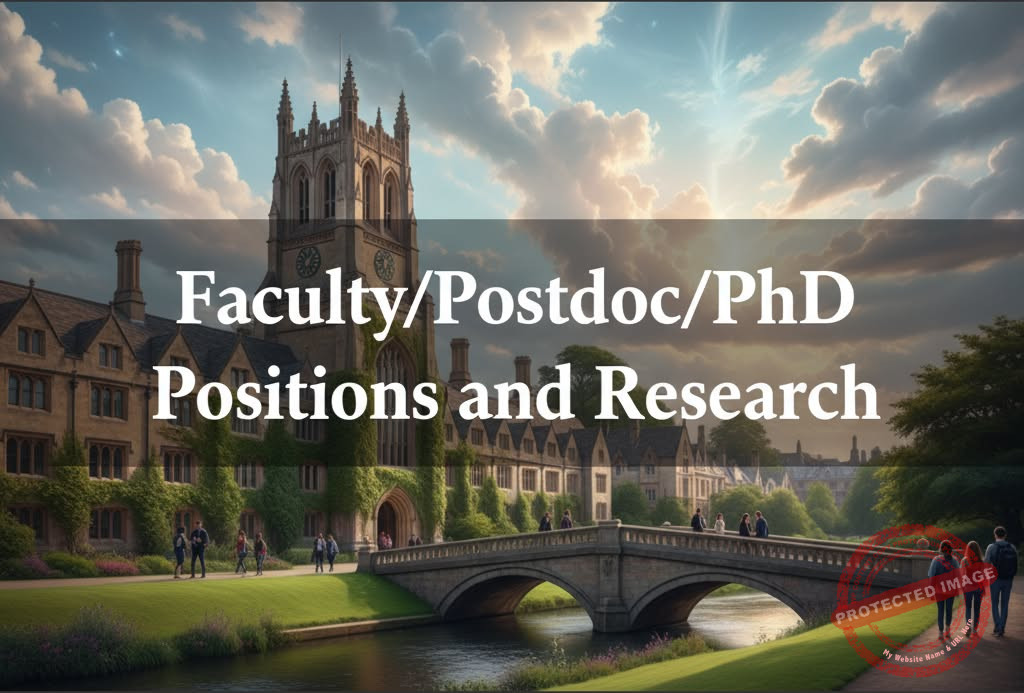Max Planck Institute, Germany invites online Application for number of Fully Funded PhD Positions at various Departments. We are providing a list of Fully Funded PhD Programs available at Max Planck Institute, Germany.
Eligible candidate may Apply as soon as possible.
(01) PhD Positions – Fully Funded
PhD position summary/title: Doctoral (PhD) and postdoctoral position (m/f/d) in Computational Biology | Biomathematics | Biosystems Engineering
A doctoral and a postdoctoral position in computational biology / biomathematics / biosystems engineering are available in Steffen Klamt’s group Analysis and Redesign of Biological Networks at the Max Planck Institute for Dynamics of Complex Technical Systems in Magdeburg (Germany). Our group develops computational methods and tools for analyzing and redesigning the microbial metabolism, with applications in metabolic engineering and bioprocess optimization.
Deadline : Open until filled
(02) PhD Positions- Fully Funded
PhD position summary/title: Three fully funded PhD student positions (m/f/d) | Computational, mathematical & experimental plant sciences
The mission of our IMPRS is to study fundamental biological processes in plants and to create knowledge and material that can empower innovative plant breeding. More than 30 research groups study regulatory networks controlling fundamental traits such as reproductive development, organ geometry and growth, innate immunity and microbiome effects on plant performance. They apply and develop a broad range of interdisciplinary technologies ranging from genetics and genomics to structural biochemistry, advanced imaging and computational and mathematical modelling in various plant species. All available projects are detailed where applicants will also find more information about the host groups.
Deadline : January 5th 2026.
View All Fully Funded PhD Positions Click Here
(03) PhD Positions – Fully Funded
PhD position summary/title: PhD Student (m/f/d) | Molecular mechanisms of sympathetic dysfunction in disease
Dysfunction of the sympathetic nervous system is a key pathophysiological feature in many cardiovascular diseases and contributes critically to disease progression and poor outcomes. Chronic overactivation of the SNS leads to structural and functional remodeling of the heart, including hypertrophy, impaired contractility, and fibrosis. These maladaptive changes arise from sustained tissue stress and neurohumoral imbalance, driving pathological crosstalk between cardiomyocytes, fibroblasts, and immune cells. Despite its central role in cardiovascular pathology, the mechanisms that initiate and maintain sympathetic overactivity remain incompletely understood. Using advanced mouse and rat models, this project aims to dissect the molecular and cellular drivers of sympathetic dysfunction and its downstream effects on cardiac remodeling. A combination of molecular profiling, imaging, and functional analyses will be applied to identify key regulators linking neuronal activation, inflammation, and tissue remodeling. In addition, the models will serve to evaluate pharmacological interventions that modulate sympathetic signaling to prevent or reverse disease progression.
Deadline : 30.11.2025.
(04) PhD Positions – Fully Funded
PhD position summary/title: PhD Position in Law (m/f/d)
The selected candidate will be part of a small group of doctoral students exploring the role of the welfare state in an era of ecological transformation. Dissertation projects may concentrate on questions of constitutional and/or administrative law, approached from an international or comparative perspective. The precise scope and methodology of each project will be shaped by the candidate’s own research interests, allowing for diverse investigations of how legal frameworks can support the emergence of an eco-social state.
Deadline : 1 December 2025
(05) PhD Positions – Fully Funded
PhD position summary/title: PhD Position (f/m/d) | Computer Vision
We are looking for a doctoral researcher to work and develop algorithms and multi-camera capturing systems for eye movements such as gaze, mutual gaze and blinks. The doctoral researcher will be co-supervised by Prof. Xucong Zhang, Delft University of Technology and Dr. Senya Polikovsky, MPI-IS. This project is funded by DFG SPP Programme Understanding Gaze (UGaze SPP 2481) and the person will be part of the School of SPP Programme as well as the International Max Planck Research School for Intelligent Systems (IMPRS-IS). The doctoral researcher is expected to work on-site in Delft with Prof. Xucong Zhang for a given time period. They are expected to have strong skills in software design and development as well as experience in computer vision and machine learning.
Deadline : Open until filled
Polite Follow-Up Email to Professor : When and How You should Write
Click here to know “How to write a Postdoc Job Application or Email”
(06) PhD Positions- Fully Funded
PhD position summary/title: 29 Interdisciplinary PhD positions | Ultrafast Science and Quantum Materials
The program offers exciting research opportunities at ultra-intense electron and X-ray sources to directly observe atomic motions during primary events. The use of ultrafast imaging over the relevant length and time scales generates new levels of understanding of the interplay between structure and dynamics. Specific areas include the theoretical and experimental aspects of quantum materials and atomically resolved dynamics, fundamental light-matter interaction, accelerator-based light sources, coherent controlled molecular and solid state dynamics, molecular imaging, extreme timescale spectroscopy, ultrafast optics and X-ray science
Deadline : 6th November 2025
(07) PhD Positions – Fully Funded
PhD position summary/title: Doctoral Fellowship | International Max Planck Research School on Learning, Institutions and Future Evolution (LIFE)
The International Max Planck Research School on Learning, Institutions, and Future Evolution is a joint international PhD Program of the Max Planck Institute for Human Development, Freie Universität Berlin, Humboldt-Universität zu Berlin, Technische Universität Berlin, the University of Michigan, the University of Virginia, and the University of Zurich. The goal of the Research School, a new iteration of the IMPRS on the Life Course, is the study of the development of human behavior from infancy to old age in the context of the physical, social and cultural dimensions of the environment. LIFE takes an integrative and interdisciplinary approach to identifying and understanding the mechanisms, institutions, and conditions that shape the human life course.
The target groups of the Research School are international post-master’s graduate students who intend to pursue a doctorate in one of the relevant disciplines (psychology, cognitive and behavioral developmental neuroscience, computational social science, sociology, computer science, economics, educational science, and applied mathematics). As a collaborative Research School, LIFE offers unique training in the dynamics of human behavior on different time scales and includes opportunities for research abroad at one of the cooperating institutions. The training program involves seminars, a series of academies, and collaborative supervision of research training.
Deadline : November 30, 2025
(08) PhD Positions – Fully Funded
PhD position summary/title: PhD positions (m/f/d) | Chemistry and Phyics of Quantum Materials
The International Max Planck Research School for Chemistry and Physics of Quantum Materials is a joint PhD program between the Max Planck Institute for Chemical Physics of Solids in Dresden, Germany, Technische Universität Dresden and the University of St Andrews, Scotland. By working together, we create a highly attractive overall package of PhD level research on solid-state chemistry and condensed matter physics, building on world‐class research activities in quantum materials at the three institutions.
Our program will provide successful candidates with a stimulating environment, in which they will have the opportunity to interact and work with world-leading scientists from the three sites and use our excellent infrastructure and facilities. Our research is generously funded and successful candidates will receive competitive payment based on the primary location of their research project.
Deadline : November 30, 2025
Click here to know “How to Write an Effective Cover Letter”
(09) PhD Positions – Fully Funded
PhD position summary/title: PhD student (f/m/d) Structure-property relationship of industrially relevant zeolites
The Weidenthaler group is specialized in operando and in situ crystallographic experiments of catalysts tested for energy-relevant applications. Our new team member will focus on in situ diffraction and scattering studies to elucidate structure-property relationships of zeolites. Communication of research results in the department, in journal articles and by oral presentations at confernces is expected.
Deadline :November 15, 2025
(10) PhD Positions – Fully Funded
PhD position summary/title: PhD student or Postdoc (m/f/d) | Physical organic chemistry
The Max-Planck-Institut für Kohlenforschung in Mülheim an der Ruhr is a renowned research institution that is engaged in basic research in the field of catalysis.
The research program Fundamental Principles of Organic Reactivity founded by Guanqi Qiu invites applications for a position as a PhD student or Postdoc in physical organic chemistry.
The Qiu group focuses on conceptualizing new principles of organic reactivity and catalysis. The research program is not bound by any particular chemical transformation, yield, or selectivity. The goal is to demonstrate the concept through flexible sets of chemical reactions, and eventually generalize the concept towards a reaction design principle.
Deadline : November 15th 2025
Connect with Us for Latest Job updates
(11) PhD Positions – Fully Funded
PhD position summary/title: Fully funded PhD positions (doctoral researcher) (f/m/d) | Quantum Materials
The Max Planck Graduate Center for Quantum Materials (MPGC-QM) currently has an open call for multiple fully funded PhD student positions. Deadline for submission of your application is December 10th 2025!
Five Max Planck Institutes (Dresden, Hamburg, Halle and Stuttgart) – all of them world-leading institutions in their respective fields – bring together their expertise in the research on quantum materials and thus offer a truly unique graduate program in this intriguing research area.
Deadline : December 10th 2025
Polite Follow-Up Email to Professor : When and How You should Write
(12) PhD Positions – Fully Funded
PhD position summary/title: PhD positions | Statistical Physics and Active Matter
The Max Planck Institute for Dynamics and Self-Organization (MPI-DS) at Göttingen, Germany, is an international, interdisciplinary and collaborative environment offering an exceptional research setting. It hosts a range of theoretical and experimental fundamental scientific research and a diverse group of researchers. Altogether, it employs about 300 people.
The LMP department engages in a wide range of theoretical research aimed at understanding the dynamics of living systems from a physical perspective. The department is headed by Ramin Golestanian and hosts a number of group leaders, postdoctoral researchers, students, and visitors.
The PhD students will engage in theoretical and/or computational research in Nonequilibrium Statistical Physics and Active Matter, under the supervision of Ramin Golestanian.
Deadline : 1st December 2025
(13) PhD Positions – Fully Funded
PhD position summary/title: PhD students (f/m/d) | NeuroTrace: Identification of early onset dementia with Artificial Intelligence
For our research group “Cognitive Neuropsychiatry” at the Max Planck Institute for Human Cognitive and Brain Sciences, Department of Neurology, in collaboration with the Department of Cognitive Neurology at Leipzig University Hospital, we are looking for two PhD students (m/f/d) for up to 3 years for the project “NeuroTrace: Identification of early onset dementia with Artificial Intelligence”. A central problem in healthcare is the increase in neurodegenerative diseases / dementia. The project aims to achieve early detection and differential diagnosis of dementia. This will enable specific therapy to be provided at an early stage.
In the project, artificial intelligence / machine learning and new multimodal imaging methods are used to carry out analyses in individual persons, which enable the transfer of group results to the individual affected person (personalized medicine). The aim is to develop classifiers with which dementia can be automatically detected using multimodal imaging (MRI & PET).
Deadline : Open until filled
(14) PhD Positions – Fully Funded
PhD position summary/title: PhD position (m/f/d) for 3 years
The project is dedicated to elucidating the role of long-range brain connectivity in human language processing and will involve EEG and MRI experiments as well as realistic modeling of biological neural networks. It is a cooperation between the TU Berlin, the TU Chemnitz, the Czech Academy of Sciences, and the MPI-CBS, funded by the DFG.
Deadline : Open until filled
(15) PhD Positions – Fully Funded
PhD position summary/title: PhD Student or Postdoc Position (f/m/d) | Computational Biomolecular Dynamics
The Research Group Computational Biomolecular Dynamics (Prof. Dr. Bert de Groot) is inviting applications for a PhD Student or Postdoc Position (f/m/d) for any of the following topics:
- Combining non-equilibrium alchemistry with machine learning
- Free energy calculations for enzyme design
- Permeation and selectivity mechanisms in potassium channels
- Simulation of electrophysiology experiments
Deadline : Open until filled
About The Max Planck Institute, Germany –Official Website
The Max Planck Society for the Advancement of Science (German: Max-Planck-Gesellschaft zur Förderung der Wissenschaften e. V.; abbreviated MPG) is a formally independent non-governmental and non-profit association of German research institutes. Founded in 1911 as the Kaiser Wilhelm Society, it was renamed to the Max Planck Society in 1948 in honor of its former president, theoretical physicist Max Planck. The society is funded by the federal and state governments of Germany.
According to its primary goal, the Max Planck Society supports fundamental research in the natural, life and social sciences, the arts and humanities in its 84 (as of January 2024) institutes and research facilities. As of 31 December 2023, the society has a total staff of 24,655 permanent employees, including 6,688 contractually employed scientists, 3,444 doctoral candidates, and 3,203 guest scientists. 44.9% of all employees are female and 57.2% of the scientists are foreign nationals. The society’s budget for 2023 was about €2.1 billion.
The Max Planck Society has a world-leading reputation as a science and technology research organization, with 39 Nobel Prizes awarded to their scientists, and is widely regarded as one of the foremost basic research organizations in the world. In 2020, the Nature Index placed the Max Planck Institutes third worldwide in terms of research published in Nature journals (after the Chinese Academy of Sciences and Harvard University). In terms of total research volume (unweighted by citations or impact), the Max Planck Society is only outranked by the Chinese Academy of Sciences, the Russian Academy of Sciences and Harvard University in the Times Higher Education institutional rankings. The Thomson Reuters-Science Watch website placed the Max Planck Society as the second leading research organization worldwide following Harvard University in terms of the impact of the produced research over science fields.
Disclaimer: We try to ensure that the information we post on VacancyEdu.com is accurate. However, despite our best efforts, some of the content may contain errors. You can trust us, but please conduct your own checks too.
Related Posts
Read More…
Credits: VacancyEdu
Disclaimer





 Serving
Serving